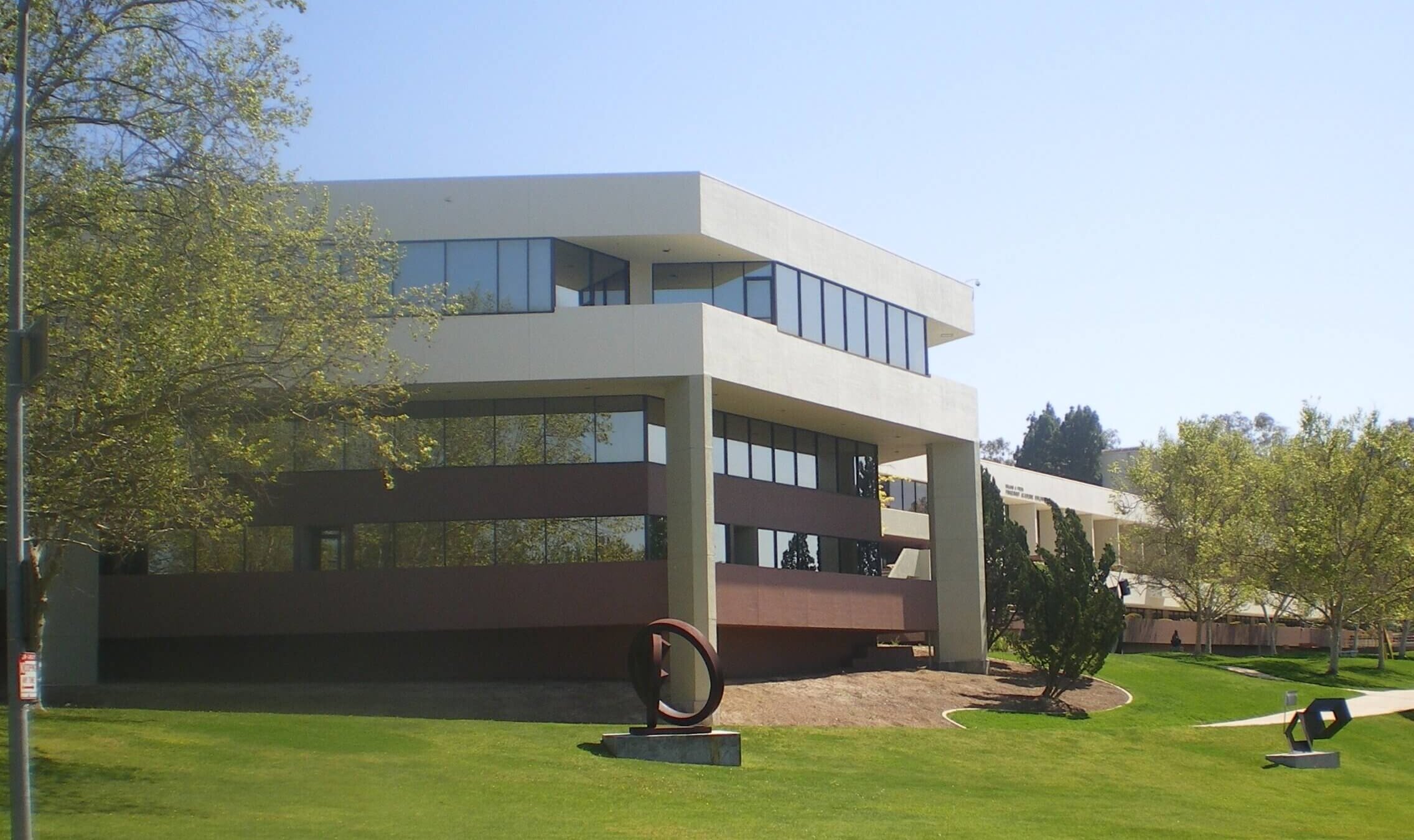That $65 million deal to sell AJU’s main campus? It just fell through.
EF Education First’s offer was pulled due to local opposition the buyer described as xenophobic

American Jewish University’s Familian Campus, a 22-acre property that has housed the Ziegler School of Rabbinical Studies since 1996. The school sold the property earlier this year, and Ziegler has relocated to a smaller campus offsite. Photo by Cbl62/Wikicommons
Nine months after agreeing to sell its Bel Air campus to an international education corporation, American Jewish University announced Wednesday that the buyer backed out, citing opposition from its would-be neighbors.
In an email to the AJU community, President Jeffrey Herbst said that EF Education First, which planned to build an international language school on the 22-acre property, notified him of the decision Wednesday morning.
“This is obviously a disappointment, but we will regroup to ensure that we use our land and facilities in the best way possible,” Herbst wrote.
The Forward reported in September that EF’s bid was worth about $65 million, about $5 million more than an offer from an adjacent Jewish day school, Milken Community School. Milken had been regarded by some in the Los Angeles Jewish community as the only hope to preserve precious community resources on AJU’s campus like the mikvah and library.
The Milken school did not respond to an inquiry Thursday about whether it was still interested in the property.
A spokesperson for AJU said Wednesday it would be exploring all options for the future of the campus.
Things fall apart
A coalition of neighbors fought the sale on the grounds that EF planned to increase the number of students living on campus above the total that lived there during the AJU era. The Lucerne, Switzerland-headquartered company, which did not immediately respond to a request for comment, conveyed to the Los Angeles Planning Commission its concerns over pressure from hostile neighbors.
EF Vice President Shawna Marino, in a letter sent to the commission Wednesday, said a number of institutions in the area had supported the sale, including Stephen Wise Temple — which as part of the deal would enjoy access to an AJU playing field. But despite repeated attempts to address neighbors’ worries, Marino wrote, “many adjacent neighbors became firmly entrenched in their opposition and communicated in ways that made us increasingly uncomfortable” about the move.
“Based on the comments we have heard and the letters submitted in opposition, it is crystal clear to us that there are individuals in the neighborhood who do not want international students in their community,” Marino added. “This is the first time we have experienced this level of fear and bias.”
Elizabeth Barcohana, who is vice president of a homeowners association of 99 homes that opposed the deal, said she was appalled by Marino’s comments. She pointed out that many of the homeowners, if not the majority, were Jewish, and that initially EF and the homeowners had amicable discussions about the terms of their takeover.
Those discussions broke down, Barcohana said, after EF responded to their concerns about enrollment by decreasing their proposed total from 1,400 to 1,200 but increasing the number of students it hoped to house on campus from 480 to 700. The influx of students could pose safety issues during an emergency evacuation in the fire-prone region, she said.
“Our concerns were always about safety, security and parking that logically flow from their high enrollment numbers,” Barcohana said.
A sad sale
AJU’s sale to a non-Jewish entity had upset some in the Jewish world. In addition to community leaders who were sorry to see a large block of real estate leave Jewish hands, donor families who had funded the campus’ expansion were dismayed that their gifts were being sold off.
“The idea that we were going to lose this for non-Jewish purposes when the funds were raised for Jewish scholarship was sad,” Michael Berenbaum, director of AJU’s Sigi Ziering Institute, which focuses on Holocaust studies, said Thursday.
But the campus had accrued millions of dollars in deferred maintenance, and having shuttered its undergraduate program in 2018, was sparsely attended even before the pandemic hit. Meanwhile, some of its online programs, such as its Introduction to Judaism course, had taken off.
Herbst told the Forward that the board came to the conclusion a more robust digital pivot made the most sense for the institution’s long-term health.
“Our mission statement doesn’t say anything about being a landowner in Bel Air,” Herbst said in February 2022. “I would argue that what’s most important about the institution is staying the same.”
From the jump, Herbst signaled he was not interested in offering a discount to a Jewish bidder, saying in an interview that if Jewish and non-Jewish entities were to bid the same amount, he would not necessarily give the Jewish party the edge.
Milken’s head of school, Sarah Shulkind, said last year that it had around 770 students enrolled from sixth through 12th grade and was looking to expand. She added that the school would be open to preserving access to the community mikvah — thought to be the only non-Orthodox kosher mikvah on the West Coast — and partnering with AJU to keep its 120,000-volume library intact.
Shulkind declined to comment Thursday.
Meanwhile, Glenn Sonnenberg, a past president of Stephen Wise Temple who had supported the sale to EF, said its failure to close would hurt the Jewish community because AJU would be unlikely to get a comparable offer.
“If people really wanted to help Jewish institutions, AJU got the highest price imaginable,” Sonnenberg said. “I don’t think it’s going to go well from here on out. If you’re the residents, be careful what you wish for. What’s the next buyer going to look like?”
Listen to That Jewish News Show, a smart and thoughtful look at the week in Jewish news from the journalists at the Forward, now available on Apple and Spotify:
The Forward is free to read, but it isn’t free to produce

I hope you appreciated this article. Before you go, I’d like to ask you to please support the Forward.
Now more than ever, American Jews need independent news they can trust, with reporting driven by truth, not ideology. We serve you, not any ideological agenda.
At a time when other newsrooms are closing or cutting back, the Forward has removed its paywall and invested additional resources to report on the ground from Israel and around the U.S. on the impact of the war, rising antisemitism and polarized discourse.
This is a great time to support independent Jewish journalism you rely on. Make a gift today!
— Rachel Fishman Feddersen, Publisher and CEO
Support our mission to tell the Jewish story fully and fairly.
Most Popular
- 1

Fast Forward Ye debuts ‘Heil Hitler’ music video that includes a sample of a Hitler speech
- 2

Culture Cardinals are Catholic, not Jewish — so why do they all wear yarmulkes?
- 3

News School Israel trip turns ‘terrifying’ for LA students attacked by Israeli teens
- 4

Fast Forward Student suspended for ‘F— the Jews’ video defends himself on antisemitic podcast
In Case You Missed It
-

Fast Forward Police clash with pro-Palestinian protesters in Brooklyn as Columbia library takeover fallout continues
-

Opinion This week proved it: Trump’s approach to antisemitism at Columbia is horribly ineffective
-

Yiddish קאָנצערט לכּבֿוד דעם ייִדישן שרײַבער און רעדאַקטאָר באָריס סאַנדלערConcert honoring Yiddish writer and editor Boris Sandler
דער בעל־שׂימחה האָט יאָרן לאַנג געדינט ווי דער רעדאַקטאָר פֿונעם ייִדישן פֿאָרווערטס.
-

Fast Forward Trump’s new pick for surgeon general blames the Nazis for pesticides on our food
-
Shop the Forward Store
100% of profits support our journalism
Republish This Story
Please read before republishing
We’re happy to make this story available to republish for free, unless it originated with JTA, Haaretz or another publication (as indicated on the article) and as long as you follow our guidelines.
You must comply with the following:
- Credit the Forward
- Retain our pixel
- Preserve our canonical link in Google search
- Add a noindex tag in Google search
See our full guidelines for more information, and this guide for detail about canonical URLs.
To republish, copy the HTML by clicking on the yellow button to the right; it includes our tracking pixel, all paragraph styles and hyperlinks, the author byline and credit to the Forward. It does not include images; to avoid copyright violations, you must add them manually, following our guidelines. Please email us at [email protected], subject line “republish,” with any questions or to let us know what stories you’re picking up.
















